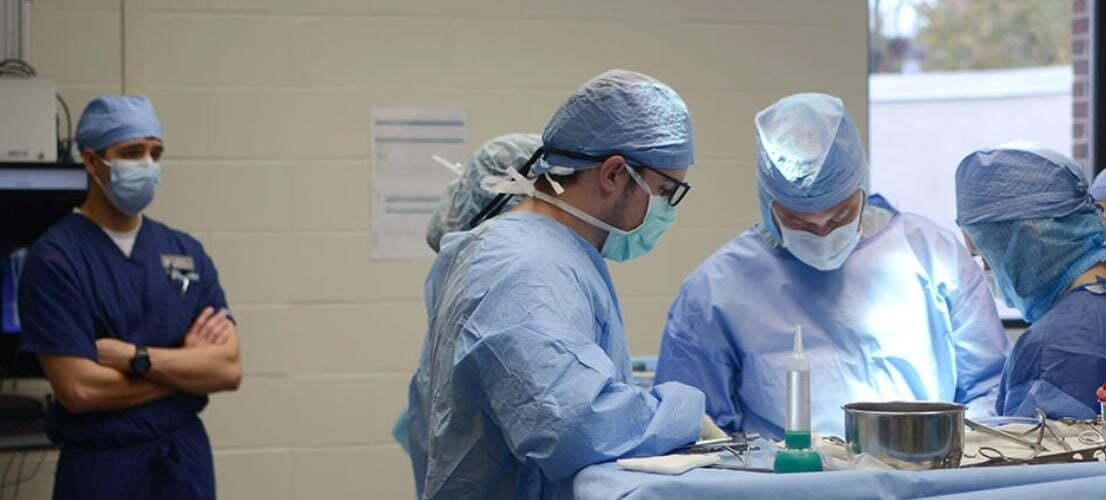
Surgery
What we do
The Surgery Service at Penn Vet comprises board-certified surgeons, residents, rotating interns, and certified technician-nursing staff focused on high-quality, compassionate care that utilizes some of the region’s most advanced surgical techniques and equipment. This comprehensive veterinary care focuses on soft-tissue, orthopedic, and minimally invasive procedures.
Our Services
Surgical Procedures
Discover the techniques and expertise involved in the following surgical fields.
Our Services
Surgical Procedures
Discover the techniques and expertise involved in the following surgical fields.
Soft-Tissue Surgery
The Soft Tissue Surgery service at Penn Vet’s Ryan Hospital specializes in treating dogs and cats that require surgery to treat conditions involving the cardiothoracic, gastrointestinal, respiratory and urogenital systems as well as disorders involving the ear, nose and throat.
- Both congenital and acquired conditions are routinely treated and oncological procedures routinely performed.
- Because of the high emergency caseload, our surgeons have a lot of experience with traumatic injuries and reconstructive surgery.
- The Service is currently staffed by six board certified surgeons, eight residents and a class of rotating interns.
- There are two Soft Tissue Surgery services that perform surgery Monday through Friday during the week. Each service alternates surgery days during the week and the service is on call every night of the week and on Saturday and Sunday for emergency cases.
- On appointment days, necessary diagnostic investigations are performed and the majority of cases are then scheduled for surgery the following day.
- Some more complex cases require extensive diagnostic procedures under anesthesia. Such procedures include CT, angiography, and biopsy, and are necessary to determine the nature and extent of disease and the feasibility of surgical therapy.
- The Soft Tissue Surgery service also receives cases transferred from the Medicine, Oncology, Intensive Care, and Emergency services. Cases transferred from these services generally receive surgery on a “medical priority” basis, especially on busy surgery days.
Orthopedic Surgery
The service provides advanced treatment for various orthopedic conditions, utilizing cutting-edge surgical techniques such as arthroscopy and total hip replacement. Collaborating closely with the Emergency Service, we address trauma cases and employ the latest fracture repair systems, including plates, external skeletal fixation, and interlocking nails.The orthopedic surgery service prioritizes high-quality,compassionate care, fosters collaborative learning, and supports research. Appointments don’t require a referral, but sharing previous diagnostic results is encouraged. We collaborate with clients and veterinarians, emphasizing patient care and providing a learning environment.
- The Orthopedic Surgery service receives cases from clinic appointments on Tuesday and Thursday.
- Cases are seen through the clinic in the morning, and diagnostic tests are performed that day. If surgery is recommended, the procedure will be discussed. Surgery can generally be scheduled within 1-2 weeks of the initial appointment day.
- Depending on your pet’s condition, necessary diagnostics and discussions, your appointment duration may vary. Generally, you should plan for 2-4 hours total appointment time.
- Drop-off for surgical procedures can occur the morning of surgery between 7-7:30 a.m. or the afternoon prior to surgery at no additional charge. Some cases require drop-off the day prior to surgery. This will be discussed with you at the time of scheduling.
- For appointments and procedures, please ensure your pet does not eat within 8 hours of their scheduled appointment unless otherwise directed by the veterinary team. Water can remain available until your scheduled appointment time.
- The Orthopedic Surgery service also receives cases transferred from the Neurology, Emergency, and Medicine services. All surgeries are performed based on medical priority/triage.
- Emergency surgery is available 24 hours a day and 365 days a year.
PLEASE NOTE: Any pets with fractures or paralysis should not wait for referral and should be brought to the Emergency Service as soon as possible.
Orthopedic Examination
One of the most challenging aspects of orthopedic medicine can be determining what specific joint, bone, muscle, or tendon is causing an animal to limp (or have other gait changes). After completing a thorough history and general physical exam, the veterinary student assigned to your pet will take them to have an orthopedic examination performed with the team. A thorough orthopedic examination includes a gait analysis, standing examination, and recumbent examination. Through this, the team will evaluate every joint and bone for notable pain, instability,effusion, swelling, or other abnormality that may indicate a disease process is occurring. We use this to recommend further diagnostics (such as X-rays or CT scan) to evaluate the specific area affected.
Procedures
The orthopedics team at PennVet performs a wide range of routine orthopedic surgeries, as well as more advanced techniques. Congenital or developmental conditions frequently seen include cranial cruciate ligament tear, patella luxation, hip dysplasia, elbow dysplasia, and juvenile diseases including OCD lesions (joint mice). We routinely address soft tissue/ligamentous injuries, traumatic injuries and fractures, and angular limb deformities, proving cutting-edge techniques to maximize surgical success. PennVet performs a wide variety of fracture fixation techniques, total hip replacements, arthroscopic procedures, and minimally invasive procedures. We work closely with the Rehabilitation Service at PennVet to optimize post-operative recovery.
Minimally Invasive Surgery
Penn Vet’s Center for Minimally Invasive Surgery has one of the most sophisticated operating room in the region, and we utilize cutting-edge surgical equipment on par with human medicine.
Our team has been instrumental in defining the role of minimally invasive surgery in veterinary medicine. Yearly, we perform hundreds of procedures safely and efficiently for various procedures including a simple spay, to the most complex heart and lung surgeries.
The following procedures can be performed minimally invasively for those patients who are suitable candidates:
Abdomen
- Spay
- Castration (cryptorchid)
- Gastropexy (Bloat/GDV Prevention)
- Bladder Stone Removal
- Urethral Stone Removal
- Intestinal Biopsy
- Liver Biopsy
- Removal of Spleen
- Removal of Adrenal Gland
- Hernia Repair
- Gallbladder Surgery
- Cancer surgery for the stomach, gallbladder, Liver and pancreas
- Removal of Kidney
Chest
- Heart Surgery
- Lung Surgery
- Removal of Heart Pericardium
- Removal of Lung for Cancer
- Lymph-node biopsy and Removal
- Chylothorax
- Pyothorax Lavage
- Thymoma Removal
Renal Transplantation
With the help of a nurse practitioner that specializes in renal transplant, our team is able to offer treatment for renal failure, with the goal of providing a good quality of life for a cat that would otherwise be unable to survive.
Preparing Your Pet for Surgery
If you are facing the possibility of surgical treatment at Ryan Hospital, we are here to help explain your pet’s individual case, diagnostic results, and surgical options. That way you will be ready to make the best decisions for your pet and your family.
- Make a list of your pet’s medications and bring this with you to your appointment. Include the name of the medication, the size (mg) of the tablet, and the amount your pet takes per day. For liquids, note the concentration (mg/ml) and the volume (mls) your pet takes per day.
- Note the name of your pet’s food and how much s/he eats per day.
- Bring a list of any supplements that you are feeding your pet.
- Be prepared to tell us if your pet has any allergies to food or medications, or if they have had a past reaction to a certain medication or vaccine. We’ll also need to know if your pet has a history of any problems with sedation or anesthesia.
- Please FAST your pet prior to their initial consult appointment, in case any additional imaging or sedation is needed. This means no food after 10 pm the night before their visit. Water is fine to continue.
- Please check with us ahead of time regarding special instructions if your pet requires any medications with food in the morning, or if your pet is diabetic.
The best way for us to understand what’s happening with your pet is for us to have as much information as possible. Be sure that we receive records from your primary care veterinarian.
- Generally we request records from the past year, especially any blood work, imaging, or pathology results leading up to your pet’s diagnosis.
- If your pet had diagnostics performed by multiple veterinarians, please make sure we have all pertinent records to review.
- Remember to ask your veterinarian to send images (x-rays, ultrasound, CT or MRI images). If these can’t be sent by email, please pick up a disk or the film radiographs to bring to your appointment.
- Bring a copy of your pet’s vaccination history. Vaccine reminders are often printed on the most recent invoice from your primary care veterinarian.
Your veterinary student will begin your consultation by taking a detailed history. We always review records from your pet’s primary veterinarian prior to your appointment, but we will likely ask additional questions to better understand what happened leading up to the diagnosis, as well as information about your pet’s past medical history. As part of our history, we may ask some of the following questions:
- When did you first notice a problem?
- Are there any changes in your pet’s activity or energy level?
- Does your pet seem to be in pain?
- If medications have been prescribed for pain, are they helping?
- Are there any changes in your pet’s appetite?
- Is your pet drinking and/or urinating more or less frequently than normal?
- Has there been any vomiting or diarrhea?
Following the history, your pet’s veterinary student will perform a detailed physical examination. Sometimes people ask about coming for a consult without their pet, but it’s very important for us to examine your pet to offer our best opinion on treatment options. Besides, we enjoy meeting your pet!
We ask our students to review their findings, and then develop a specific problem list, list of differential diagnoses, and diagnostic/treatment plan for your pet. This discussion may take 15-30 minutes, and often involves quizzing our students and reviewing your pet’s disease process. The veterinary team will then return to the exam room with the student. We may repeat some of the same history questions or ask them in a different way, and we will also repeat the physical exam.
The next step in your appointment with us is to use various tests to get the best and most precise diagnosis of your animal’s condition. We will evaluate your pet’s body to determine if and where surgical intervention might be the appropriate clinical approach. Depending on your animal’s condition, diagnostic tests may include:
- Minimum Database (complete blood count, chemistry panel, urinalysis)
- Digital Radiographs (x-rays)
- Ultrasound
- CT scan or MRI
These diagnostic tests can often take several hours, especially if imaging tests are needed. We always give a time estimate based on our diagnostic recommendations, but plan to spend at least three hours at Penn Vet on the day of your first consultation. In some cases, it may be possible to leave your pet with us for a few hours, and meet again at the end of the day to discuss diagnostic results.
Treatment Recommendations
Once we have all of the information above, we can make specific treatment recommendations for your pet and provide information on potential treatment, prognosis, and cost. We try to discuss all treatment alternatives so that you can make an informed decision on what will work best for your pet and your family.
There is no pressure to make a decision on the day of your appointment. Many families take information home and consider all of the options before electing to start treatment. We are always happy to answer questions that you may think of after your appointment. Our primary goal is to help you and your pet, and we are here to help guide you through treatment with compassionate care and quality medicine.
Our Care Team

Section Chief, Surgery
Jason Syrcle, DVM, VMD, DACVS
Professor of Small Animal Clinical Orthopedic Surgery
Veterinarians
Residents

Kathryn Biehl, DVM

Camille Duvieusart, BVMS

Karl Hoenecke, BVetMed

XiaoXiao Lederer, DVM

Elizabeth Lemmon, VMD, PhD

Andrea (Annie) Mastorakis, DVM

Maya Sekhar, VMD
Michelle Capps, BA, CVT VTS (Surgery)
Surgery Supervisor
Rachel Balabuszko, CVT
Soft Tissue Surgery Coordinator
Marta Bates, CVT
Assistant Surgery Supervisor
Scott Baxt, CVT
Nurse Assistant for Surgery and Radiology
Jess Bosco, CVT
Soft-tissue Surgery Coordinator
Katie Brewer
Surgery Veterinary Nurse
Peg DeLisle, CVT
Lisa Forde, CVT
Rebekah Fries, RVT
Orthopedic Surgery Coordinator
Patricia Knapp, CVT
Surgical Oncology Coordinator
Stephanie Fullmer, CVT
Orthopedic Surgery Coordinator
Nicole Smith
Surgery Veterinary Nurse
Karen Steffa-McQuillan
Surgery Veterinary Nurse
Briana Waters
Central Sterilizing Manager
Research in Advanced Urinary Care
Our clinical research team within Penn Vet’s Advanced Urinary Care service includes translational immunologists, transplant immunologists and surgeons, and extracorporeal therapy criticalists who are exploring the adoptive transfer of immune regulatory cell types such as regulatory T cells (Tregs) and iNKT cells to promote immune tolerance.
Our goal is to apply our combined expertise to develop canine immune regulatory cellular therapies that can be used either alone or in combination with other immunomodulatory platforms to enable successful allogeneic renal transfer in canines with chronic renal failure.
Transplantation Immunology within Advanced Urinary Care
Rejection of major histocompatibility unmatched, allogeneic tissues and cells are a significant barrier to successful organ transplant and off-the-shelf, genetically engineered adoptive T cell therapies. Overcoming this barrier by exploiting the beneficial effects of immune regulatory cell would enable more patients to receive life-saving organ transplants or adoptive T cell therapies that have the potential to cure patients with hematological and solid cancers.
Our clinical research team within Penn Vet’s Advanced Urinary Care service includes translational immunologists, transplant immunologists and surgeons, and extracorporeal therapy criticalists who are exploring the adoptive transfer of immune regulatory cell types such as regulatory T cells (Tregs) and iNKT cells to promote immune tolerance.
Our group has significant expertise in transplant immunology and renal transplant surgery and in the generation and use of adoptive cellular therapies in canine cancer patients.
Our goal is to apply our combined expertise to develop canine immune regulatory cellular therapies that can be used either alone or in combination with other immunomodulatory platforms to enable successful allogeneic renal transfer in canines with chronic renal failure.
Ryan Veterinary Hospital
Emergencies:
(215) 746-8911
By Appointment:
(215) 746-8387









